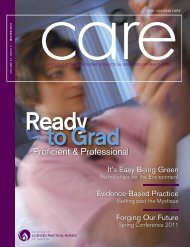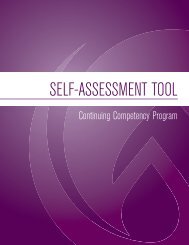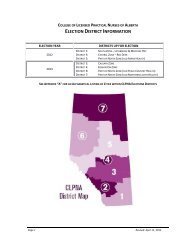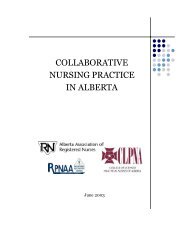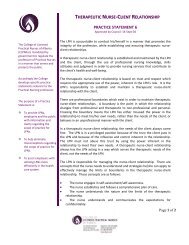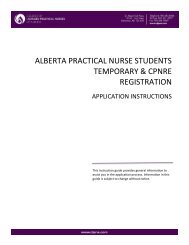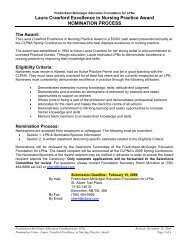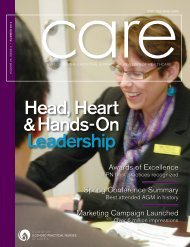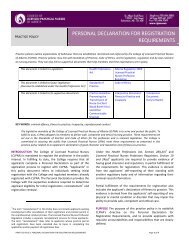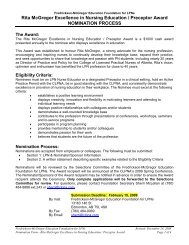Download PDF - College of Licensed Practical Nurses of Alberta
Download PDF - College of Licensed Practical Nurses of Alberta
Download PDF - College of Licensed Practical Nurses of Alberta
- No tags were found...
Create successful ePaper yourself
Turn your PDF publications into a flip-book with our unique Google optimized e-Paper software.
esearchHQCA finds 64% <strong>Alberta</strong>ns Satisfied with Healthcare ServicesThe Health Quality Council <strong>of</strong> <strong>Alberta</strong>(HQCA) released the results <strong>of</strong> itsbiennial survey <strong>of</strong> <strong>Alberta</strong>ns’ satisfactionand experience with healthcareservices. Overall, 64% <strong>of</strong> <strong>Alberta</strong>ns weresatisfied with healthcare services, comparedto 62% in 2010. Most results in the2012 survey remain relatively unchangedcompared to the 2010 survey.The survey <strong>of</strong> 4,803 <strong>Alberta</strong>ns consists<strong>of</strong> more than 100 questions garnering respondents’general perceptions <strong>of</strong> healthcareand actual healthcare experiences, aswell as satisfaction with specific healthservices province-wide.The factors that most influence <strong>Alberta</strong>ns’overall satisfaction, in order <strong>of</strong> influence,are:• ease <strong>of</strong> access to healthcare services(51% rated access as easy)• quality <strong>of</strong> healthcare services (77%rated quality as good or excellent)• how well all healthcare pr<strong>of</strong>essionalscoordinate their efforts to servepatient needs (49% rated coordinationas very good or excellent)• handling <strong>of</strong> serious complaints (20%are satisfied with complaintshandling)• satisfaction with emergency departmentservices (59% are satisfied withemergency department services)• satisfaction with family doctorservices (84% are satisfied withfamily doctors)• satisfaction with specialist services(80% are satisfied with specialistservices)“It is important to examine the factors thatinfluence <strong>Alberta</strong>ns’ satisfaction so thathealth policy makers and health serviceproviders can take into considerationwhat <strong>Alberta</strong>ns are saying about theirhealthcare experiences,” says Dr. JohnCowell, Chief Executive Officer, HQCA.“Coordination <strong>of</strong> care, for example,is one <strong>of</strong> the top three most influentialfactors driving overall satisfaction, andyet we have not seen improvements inthis area in any <strong>of</strong> the six surveys we haveconducted since 2003.”Less than 50% <strong>of</strong> respondents in 2012rated how well healthcare pr<strong>of</strong>essionalscoordinated their efforts to servetheir needs as very good or excellent.Information in a recent Health Council<strong>of</strong> Canada (HCC) report from a survey <strong>of</strong>primary care physicians complements theHQCA findings. For example, the reportstated that only 13% <strong>of</strong> <strong>Alberta</strong> primarycare physicians receive information forcontinued management <strong>of</strong> their patientswithin 48 hours <strong>of</strong> hospital discharge.Information from the HCC report inrelation to access to healthcare servicesalso mirrored the HQCA’s patientexperience results. The report stated thatonly 41% <strong>of</strong> primary care physicians in<strong>Alberta</strong> say they have an arrangement fortheir patients to see a physician or nursewhen the practice is closed, other than ahospital or emergency department.“In the almost 10-year history the HQCAhas been conducting this biennial survey,we have seen a change from 52% to 64%in how <strong>Alberta</strong>ns rate their satisfactionwith healthcare services,” adds Dr.Cowell. “It is worthy to note that atthe same time, while the populationhas grown 22%, adjusted public healthexpenditures per person in <strong>Alberta</strong>,reported by the Canadian Institute forHealth Information, have increased from$3,994 per capita in 2003 to a forecast<strong>of</strong> $6,570 per capita in 2011 - a 64%increase.”Other key findings:• Respondents in <strong>Alberta</strong> Health Services’North zone were significantly less likelyto be satisfied with healthcare services(56%) as compared to the overall ratingfor <strong>Alberta</strong> (64%).• When asked about experiences <strong>of</strong>unexpected harm, 11% <strong>of</strong> respondentsreported that they or an immediatefamily member experienced harm whilereceiving healthcare sometime in the pastyear, which is significantly more than2010 (9%), but less than 2003, 2004,and 2006.• 28% <strong>of</strong> <strong>Alberta</strong>ns have never had a flushot. The North zone has significantlymore respondents who have never had aflu shot (38%) compared to Edmonton(27%), Central (31%), Calgary (26%)and South (26%) zones. The mostcommon reason respondents reportedthey did not have the flu shot in the pastyear is because they did not think it wasnecessary (47%), followed by they hadnot gotten around to it (21%).• Results were analyzed by <strong>Alberta</strong>ns’self-reported health status to comparethe experience <strong>of</strong> those categorized as lesshealthy to those categorized as to be ingood health. The respondents’ state <strong>of</strong>health greatly influenced how they ratedtheir experience. For example, <strong>Alberta</strong>nsin good health were most likely to besatisfied with healthcare services received(71%), and respondents consideredthe least healthy were less likely to besatisfied (56%) – both ratings differedsignificantly from the overall satisfactionrating <strong>of</strong> 64%.Satisfaction and Experience withHealthcare Services: A Survey <strong>of</strong><strong>Alberta</strong>ns 2012 measured responsesfrom 4,803 <strong>Alberta</strong>ns who were 18 years<strong>of</strong> age and older, and had a land-linetelephone. To ensure respondents wererepresentative <strong>of</strong> <strong>Alberta</strong>ns, quotas wereset for age and gender groups within each<strong>of</strong> the five <strong>Alberta</strong> Health Services’ zones.Some questions were limited to only therespondents who had an experience withthe healthcare system in the previous12 months. Survey weights were usedto make the results more representative<strong>of</strong> the population. Where possible, theHQCA’s independent survey comparesthe 2012 results with those from 2010,2008, 2006, 2004 and 2003.The 2012 survey is <strong>of</strong> interest becauseit can be compared against benchmarkresults from 2010, which was the firstyear the HQCA measured satisfactionand experience since the formation <strong>of</strong><strong>Alberta</strong> Health Services. nThe technical report and a summary <strong>of</strong> thefindings are available at www.hqca.ca.care | spring 2013 29



